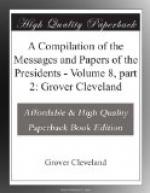high assembly for consultation upon American interests.
It was not considered a conclusive reason for declining
this invitation that the proposal for assembling such
a Congress had not first been made by ourselves.
It had sprung from the urgent, immediate, and momentous
common interests of the great communities struggling
for independence, and, as it were, quickening into
life. From them the proposition to us appeared
respectful and friendly; from us to them it could scarcely
have been made without exposing ourselves to suspicions
of purposes of ambition, if not of domination, more
suited to rouse resistance and excite distrust than
to conciliate favor and friendship. The first
and paramount principle upon which it was deemed wise
and just to lay the corner stone of all our future
relations with them was disinterestedness;
the next was cordial good will to them; the third
was a claim of fair and equal reciprocity. Under
these impressions when the invitation was formally
and earnestly given, had it even been doubtful whether
any of the objects proposed for consideration
and discussion at the Congress were such as that immediate
and important interests of the United States would
be affected by the issue, I should, nevertheless,
have determined so far as it depended upon me to have
accepted the invitation and to have appointed ministers
to attend the meeting. The proposal itself implied
that the Republics by whom it was made believed
that important interests of ours or of theirs rendered
our attendance there desirable. They had given
us notice that in the novelty of their situation and
in the spirit of deference to our experience they
would be pleased to have the benefit of our friendly
counsel. To meet the temper with which this proposal
was made with a cold repulse was not thought congenial
to that warm interest in their welfare with which
the people and Government of the Union had hitherto
gone hand in hand through the whole progress of their
revolution. To insult them by a refusal of their
overture, and then invite them to a similar assembly
to be called by ourselves, was an expedient which never
presented itself to the mind. I would have sent
ministers to the meeting had it been merely to give
them such advice as they might have desired, even
with reference to their own interests, not involving
ours. I would have sent them had it been merely
to explain and set forth to them our reasons for declining
any proposal of specific measures to which they might
desire our concurrence, but which we might deem incompatible
with our interests or our duties. In the intercourse
between nations temper is a missionary perhaps more
powerful than talent. Nothing was ever lost by
kind treatment. Nothing can be gained by sullen
repulses and aspiring pretensions.




